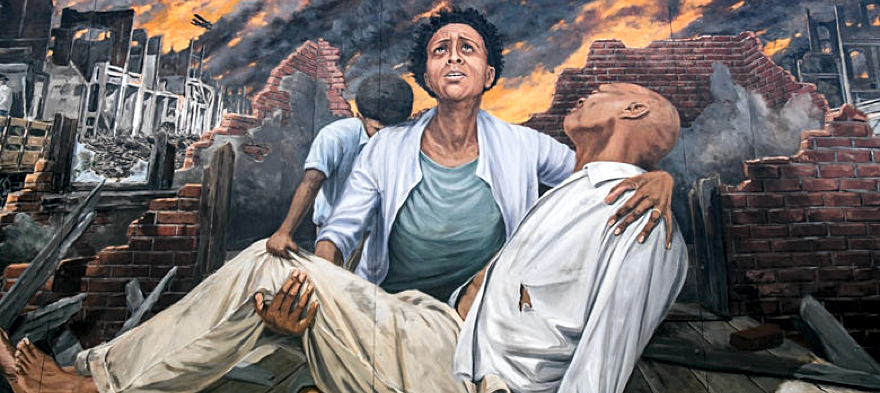
Jun 15, 2021 12:00:00 AM
by Deborah Gist
One hundred years ago in Tulsa, a white mob looted, burned, and firebombed the community of Greenwood, home to Black Wall Street—a thriving economic and social center for Black Tulsans. In the span of just hours, white Tulsans destroyed 40 square blocks with more than 23 Black churches, 70 Black-owned businesses, 1,400 Black-owned homes, and 10,000 Black residents.
[pullquote position="right"]The Tulsa Race Massacre destroyed this thriving “city within a city”[/pullquote]— burning it to the ground, its residents driven from their homes, beaten, imprisoned, and murdered; their homes and businesses looted and set ablaze. The massacre robbed two generations of Black Tulsans the foundation of their family legacy and the opportunity to grow generational wealth. To this day, the death toll of the massacre is unknown as our city undertakes the process of finding and excavating mass graves to finally give the residents of Greenwood the dignified burial they deserve.
At Tulsa Public Schools, we remember and celebrate this community of Black doctors, teachers, dentists, lawyers, pastors, restaurateurs, retailers, real estate agents, dressmakers, bankers, printers, photographers, journalists, barbers, hoteliers, grocers, husbands, wives, mothers, fathers, daughters, sons, friends, neighbors, and civic and community leaders. In that remembrance, we honor Black excellence, entrepreneurship, and economic prosperity building a strong foundation for generational wealth, health, and community.
We remember the dream and promise of that community ripped away cruelly, violently, and senselessly in an act of state-sanctioned terrorism. We remember and recognize the damage done by nearly 100 years of white silence, denial, and refusal to name the event for what it was: a massacre.
During this centennial year of the Tulsa Race Massacre and the destruction of Greenwood, we mourn these painful losses, and we commemorate the lives that were lost. We also celebrate the thriving community that was built and the resilience that was shown in the face of horrific acts of violence—physical and economic.
[pullquote]As educators teaching this hard history, we can cultivate young leaders who will be relentless in seeking truth, justice, restoration, and reconciliation for Black Tulsans.[/pullquote] We can create safe spaces for students to reflect on the past, think critically about the present, and learn how to build a future society where all Tulsa citizens share equitable rights, freedoms, and opportunities.
Writer Lois McMaster Bujold said: "The dead cannot cry out for justice. It is a duty of the living to do so for them."
Across the next 100 years, [pullquote]we will continue to hold that duty sacred and teach our children the ugly and painful truths that too many of their parents and grandparents were willfully and shamefully denied.[/pullquote] This honest and complete history will be a catalyst for our children to drive change in the world when they leave our care, becoming the leaders our community—our country and world—needs and deserves. The real history of Greenwood was hidden for so very long—and now it is our job to ensure it remains public—not only for justice and reparation, but for future generations of Americans.
Author and historian Hannibal Johnson says: "We don’t get to be the best community we can be unless we address the wounds of the past."
These wounds—as meaningful today as a century ago—are our shared responsibility to tend and heal. White leaders and allies must elevate and demand space for Black voices, listen humbly, and recognize that centuries of racial trauma and oppression are not easily overcome. We must leverage the privilege that white skin affords to dismantle the very systems that sustain it.
Johnson asks a simple, but powerful, question of Tulsans as we work toward reconciliation in this centennial year: "What are you doing, what is your role, and what’s your responsibility?"
How will we choose to respond?
Deborah Gist is the superintendent of Tulsa Public Schools. She runs the district so Tulsa children, family and teachers can find opportunities to make a difference. She started her career in education as an elementary school teacher for several years, eventually moving into administration.
Few issues in education spark more tension and debate than standardized testing. Are they a tool for equity or a burden on students? A necessary check on school systems or a flawed measure of...
Charter schools are public schools with a purpose. Operating independently from traditional school districts, they're tuition-free, open to all students, and publicly funded—but with more flexibility...
Despite the benefits of a diverse teaching force, prospective teachers of color fall out of our leaky preparation pipeline at every stage: preparation, hiring, induction, and retention. Here’s what...
Ed Post is the flagship website platform of brightbeam, a 501(c3) network of education activists and influencers demanding a better education and a brighter future for every child.
© 2020-2025 brightbeam. All rights reserved.
Leave a Comment